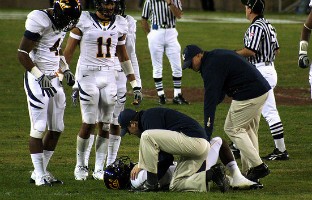Unnecessary roughness: The moral hazards of football
On New Year’s Eve in 1967, my father and two cousins awaited a bus in Cumberland, Wisconsin, bound for Madison. They waited in the car not just to avoid the bitter cold, but to listen on the radio to the tense conclusion of the NFL title game between Green Bay and Dallas, the game that would be remembered as the Ice Bowl. They were so intent on the last-second heroics of Jerry Kramer and Bart Starr that they failed to notice the Greyhound pull up, load passengers and depart without them.
Like many native Wisconsinites, I inherited a religious piety that might bloom and wither but a devotion to the Packers that is evergreen. I can tell you exactly where I was during each of the team’s Super Bowl appearances in my lifetime, as well as during each of their playoff flameouts. I own their victories—and their unique community-based status—with an unwholesome sense of pride, and their defeats with an equal bitterness. I’ve been watching football as long as I can remember.
That means that I was watching when Packers defensive tackle Charles Martin assaulted and injured Bears quarterback Jim McMahon long after the whistle ended a play in 1986. It was hard not to think of the incident last August when McMahon joined six other players to sue the NFL for negligence in handling concussions and their connection to long-term cognitive ailments. This was just one of 80 different lawsuits related to concussions filed by more than 2,600 former players and widows.





